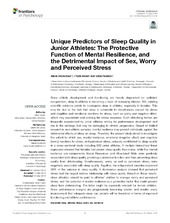| dc.description.abstract | Since athletic development and functioning are heavily dependent on sufficient recuperation, sleep in athletes is becoming a topic of increasing interest. Still, existing scientific evidence points to inadequate sleep in athletes, especially in females. This may be due to the fact that sleep is vulnerable to disturbances caused by stress and cognitive and emotional reactions to stress, such as worry and negative affect, which may exacerbate and prolong the stress response. Such disturbing factors are frequently experienced by junior athletes aiming for performance development and rise in the rankings, but may be damaging to athletic progression. Based on limited research in non-athletic samples, mental resilience may protect individuals against the detrimental effects of stress on sleep. Therefore, the present study aimed to investigate the extent to which sex, mental resilience, emotional (negative affect) and cognitive (worry) reactions to stress, and perceived stress, uniquely contributed to sleep quality in a cross-sectional study including 632 junior athletes. A multiple hierarchical linear regression showed that females had poorer sleep quality than males, while the mental resilience sub-components Social Resources and Structured Style were positively associated with sleep quality, providing a protective function and thus preventing sleep quality from deteriorating. Simultaneously, worry, as well as perceived stress, were negatively associated with sleep quality. Together, the independent variables explained 28% of the variance in sleep quality. A dominance analysis showed that perceived stress had the largest relative relationship with sleep quality. Based on these results, close attention should be paid to athletes’ abilities to manage worry and perceived stress, and the potential of mental resilience as a protective factor that could prevent sleep from deteriorating. The latter might be especially relevant for female athletes. Since performance margins are progressively becoming smaller and smaller, every improvement that adequate sleep can provide will be beneficial in terms of improved functioning and athletic performance. | en_US |

